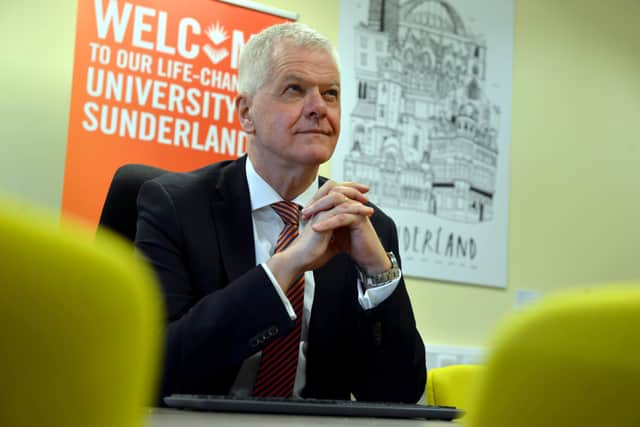University of Sunderland staff to strike for five days in row over pay and conditions
and live on Freeview channel 276
University of Sunderland staff will walk out for five days later this month in a long-running dispute over pay and working conditions.
Members of the University and College Union (UCU) at 136 universities will walk out for five consecutive days from September 25, while strikes will hit four Scottish universities on slightly different dates to coincide with local action by other unions.
Advertisement
Hide AdAdvertisement
Hide AdThe union also announced it had withdrawn its marking and assessment boycott which started in April.


The union will begin reballoting its members at universities over industrial action, warning this will allow it to escalate the dispute by taking further action this year and into 2024.
Staff are continuing other forms of industrial action, including working to rule, not undertaking any voluntary activities, and not rescheduling lectures or classes cancelled due to strike action.
The union says an imposed pay rise for this year was worth 5% for most of its members.
Advertisement
Hide AdAdvertisement
Hide AdGeneral secretary Jo Grady said: “We are left with no option but to strike during the start of term because our members refuse to stand by while pay is eroded and staff are shunted onto gig-economy contracts.
“It is shameful that vice-chancellors still refuse to settle the dispute despite a year of unprecedented disruption, and have instead imposed a pay award that staff overwhelmingly rejected.
“Universities are richer than ever, generating tens of billions of pounds in income and hoarding billions more in cash deposits, but they won’t give staff their fair share.
“A pay award of 5% is a huge real-terms pay cut and is substantially lower than school teachers received.
Advertisement
Hide AdAdvertisement
Hide Ad“We have sought to settle this dispute at every opportunity, including agreeing to a joint review of sector finances, but we are faced with employers that want to see staff and students suffer.
“We desperately hope vice-chancellors realise we are going nowhere without a fair settlement and make us a realistic offer. If they do not, campuses will be marred by picket lines during freshers’ week, and we will launch a new strike ballot allowing us to take action well into 2024.”
The union is seeking an above inflation pay rise, saying that pay has fallen in real terms by quarter since 2009.
In response to the decision to end the marking and assessment boycott Raj Jethwa, chief executive of the Universities and Colleges Employers Association (UCEA), said: “UCEA welcomes the vote by UCU members to end the marking and assessment boycott.
Advertisement
Hide AdAdvertisement
Hide Ad“There is now an urgency for UCU members who had participated in the boycott to prioritise marking for those remaining students who have still not received the necessary results to graduate in 2023-24.
“It is, therefore, disappointing that, at the same time as ending the boycott, UCU is attempting to inflict maximum damage before its mandate expires, by calling strike action for late September.
“UCU is intentionally seeking to target the important welcome weeks which many institutions provide during this vital time for new students. It is disappointing that UCU seeks to disrupt welcome weeks instead of providing support for new students.
“UCU must now seriously reconsider this response from their members as their HEC (executive) tries to launch another ballot for industrial action for the new academic year.
Advertisement
Hide AdAdvertisement
Hide Ad“Nevertheless, UCEA welcomes UCU’s acceptance of our proposals for independently-facilitated talks on a review of sector finances and further talks on the important pay-related matters raised by the UCU and the other unions.”
Sir David Bell, the University of Sunderland’s Vice-Chancellor and Chief Executive said: "I am disappointed by UCU’s decision to undertake strike action just as the new academic year is underway. While such action is not widely supported at the University, and previously has had minimal impact, it is still worrying for the students who might be affected by it.


"The timing of this action is also odd because it relates to a pay settlement that has been and gone, with our staff already having received a 5% pay increase which fully took effect in August this year.
"On a more positive note, UCU’s marking and assessment boycott has been ended. Although it had no real impact on our students in Sunderland last year, the threat of it did cause concern and I am pleased that has now been lifted."
Comment Guidelines
National World encourages reader discussion on our stories. User feedback, insights and back-and-forth exchanges add a rich layer of context to reporting. Please review our Community Guidelines before commenting.